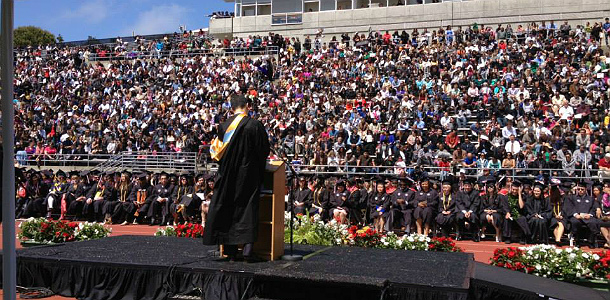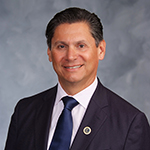
(Photo Credit: City College of San Francisco)
The issue of economic insecurity is a huge impediment for millions of Californians who want to achieve the California Dream. Eighteen million Californians live in or near poverty—and something must be done to reduce that number and expand our state’s middle class. The California Economic Summit has launched a public discussion on the issue—called Elevate CA which is recruiting Californians who are similarly concerned. For California Community Colleges Chancellor Eloy Ortiz Oakley, this is an issue near and dear. As a product of, and now leader of, the community colleges—he thinks they are part of the solution.
When it comes to social mobility, our nation is stuck in neutral.
Too many of our citizens are being squeezed out of a middle class that has found itself on a steady decline. Yet, at the same time, too many employers, large and small, are finding it difficult to secure workers with the skills necessary to fill jobs in an increasingly complex economy.
The California Community Colleges system is the state’s engine of social and economic mobility, and we must remain at the forefront in meeting and overcoming these challenges. We are doing so through the Strong Workforce Program, which is infusing $200 million annually to build career education efforts that lift low-wage workers into living-wage jobs. And we are doing so in our commitment to focus relentlessly on the end goals of our students, a commitment we articulate in a new California Community Colleges strategic plan, Vision for Success: Strengthening the California Community Colleges to Meet California’s Needs.
Vision for Success culminates more than six months of meetings and consultations with employers, social justice advocates, researchers, academics and ordinary Californians. This new vision comprises several ambitious goals, including increasing by at least 20 percent the number of students earning an associate degree, credential, certificate or specific skill set that prepares them for an in-demand job; promising to increase the number of students in career education programs who secure jobs in their field of study by 15 percent; and pledging to boost the number of students who transfer to UC and CSU by 35 percent.
Among the other goals is a promise to eliminate the achievement gap once and for all and reducing the number of unnecessary classes students are taking in earning a degree or certificate – a burden that is raising the cost of an education and keeping students from focusing squarely on the task at hand.
California needs to train one million more workers with middle-skilled credentials to fuel our regional economies and advance social mobility. It has been estimated that by 2020, nearly two-thirds of all jobs in the U.S. economy will require more than a high school diploma. But closing the skills gap can only be done if employers and educators work together. And thanks to advisory boards comprising business and labor, our community colleges offer an abundance of apprenticeship and career education programs that are growing earnings and boosting careers.
Quality and affordable career programs work. They fuel the future in a range of industries such as health care, hospitality, manufacturing, environmental health, computer technology, agriculture, and more. More than 100 career education programs offered in the California Community Colleges system have been designated among the ranks of Strong Workforce Stars for their successes in training students for new careers or sharpening their skills in their current professions.
Today’s students are tomorrow’s workforce. By prioritizing the student experience in designing programs and services, by pairing high expectations with high levels of support, by placing an emphasis on data analysis, by ensuring that programs are affordable, and by taking ownership of how we are performing – all of which are commitments in our new Vision for Success, the California Community Colleges will succeed in providing the education and training needed for greater numbers of Californians to fill the workforce pipeline and earn livable wages.
 As an Army veteran and first-generation college student who began my journey into higher education at Golden West College, I speak from experience when discussing the impact the California Community Colleges system is having on people’s lives. Golden West College put me on the path to be here with you today, and I want to make sure anyone who so desires has the same opportunity.
As an Army veteran and first-generation college student who began my journey into higher education at Golden West College, I speak from experience when discussing the impact the California Community Colleges system is having on people’s lives. Golden West College put me on the path to be here with you today, and I want to make sure anyone who so desires has the same opportunity.

